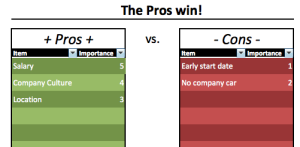 If you’re looking for an internship, it can be a struggle. You’re told you need one, but they don’t give you a roadmap to find one. So, it’s likely that you’re having trouble deciding exactly where to start.
If you’re looking for an internship, it can be a struggle. You’re told you need one, but they don’t give you a roadmap to find one. So, it’s likely that you’re having trouble deciding exactly where to start.
There’s so much talk at school and online that it’s difficult to sort through the useless information to the quality information. But, let this guide be your start.
I followed these steps and landed an internship for every summer in college, plus a couple internships throughout the school year. Go through this list, and you’ll be in good position to have multiple offers.
1. Family And Friends
Everyone knows how important it is to network. But, many times people think of networking as only finding new connections. While this is a form of networking, a better use is to have conversations with your immediate contacts and tell them you’re looking for an internship.
Go to your parents, parents’ friends, friends, and friends’ parents. If you’re blessed with a good opportunity from your parents or someone close, then take it and don’t feel like you have to go get a position on your own. (My only consideration is to maybe look for another internship only if your last name is on the company’s door. This might be a hard sell when applying for full-time jobs.) There is no shame in using what is in front of you, and you don’t need to tell people how you got the gig if you’re uncomfortable sharing.
If one of your college friends loved their company last summer, then you might have an immediate in for that position the next summer. Ask them about the position to make sure it’s right for you. Also, this may be obvious, but ask the location and whether it is paid or unpaid.
Then, move on to more strategic questions of how they got it, who is the best contact to talk to, and what does the organization look for in the interview process. If you’re really close friends with this guy or girl, ask them to put in a good word for you at the company. You never know how much that can help.
Also, let your parents network for you. The more help you enlist, the wider net you can cast for internships.
2. Professors
In an interview on Take Your Success, an engineering student said:
“I would go to professors for internship and job guidance. Professors are very useful because a lot of engineering professors have worked for engineering companies before teaching, so using them is a huge resource. Almost all of them want to help you and they’ve done it so they know how to help.”
I completely agree with this advice for any field, not just engineering.
Professors have so many contacts inside and outside the university. But, you wouldn’t know that unless you asked them, and most students don’t ask. So, to get an advantage on the competition, schedule a time to meet with your professor.
Then, in their office or after class, tell them you’re looking for an internship and that you hope they could point you in the right direction to contacts or companies. Odds are that they will be glad to assist you and give you rare insight.
3. Career Services
The career service team at your university is working with companies to schedule on-campus informational nights and recruiting. So, they are going to have the most up-to-date news about what companies are coming to campus and for what positions.
Visit the career service office and talk to an employee. If you can learn who is coming to campus before other students (and before its published online), you can start preparing earlier than them.
Also, it’s wise to tell them what types of work you’re specifically looking for, and if they could keep their eye out for you, then you would be very thankful.
Then, companies often post internships throughout the year on your school’s career service website. These can be a goldmine!
4. On-Campus Recruiting Events
On-campus recruiting events are very convenient for landing an internship. Hundreds of companies come to your school and you can pick and choose what ones to talk to and give your resume for a potential interview.
It’s a great idea to go to these events your school hosts, whether it’s in the fall or spring. From my experience, companies in the fall are more often looking for full-time positions, and the spring offers greater opportunity for students looking for internships.
The possibility of not having to travel anywhere, applying and interviewing the next week, and getting a quick offer from an initial on-campus recruiting event can’t be ignored.
5. Online Searches
Online searches have the lowest success rate in my opinion—it’s going to be frustrating to send out 50 applications and receive a reply from 5—but they can still be valuable in finding an internship.
An online search is useful in getting positions across the United States, where your parents and friends, professors, and career service might only be able to help in a local area.
Also, look for email addresses of company recruiters and send an email that shows your interest in the position. Blasting resumes at companies where you have no connections usually doesn’t go well.
Some reliable websites include: internships.com and indeed.com. If you’ve gone through steps 1-5 without any success, don’t freak out.
6. Twitter
When you look to Twitter as your job board, there’s less competition because not many other people do. But there’s also great opportunity regardless of the competition.
Twitter gives you an easy medium to connect with organizations, recruiters, and hiring managers. Where LinkedIn messages and cold emails come off as cold, a tweet has a personable feel to that that makes all the difference. Here’s how to use Twitter to get a job.
7. Look Outside Your Major
Too many students get stuck in one mindset that they have to find an internship in their field of study. This thinking can severely limit options.
An internship outside your major can turn into a great learning experience that makes you a more well-rounded candidate for future positions. Also, doing an internship that’s outside your major can open you up to different possibilities like working for a small organization, non-profit, or start-up.
Plus, it’s not difficult to market a previous internship outside your major when you’re applying for a full-time job in your field of study, so don’t worry. Often times, this unusual experience can make you positively stand out compared to candidates who all have similar experiences.
* Buy An Internship
I’m not going to number this option, but buying an internship can be a good decision for some people. If your parents are happy to pay, then you might want to discuss interning through a company like University of Dreams.
Internships like these can get you greater access to important people, experiences, and opportunities that other jobs usually can’t, which is why they’re so expensive. Yet, if this internship turns out to be a place where you build amazing contacts for the rest of your professional life, or potentially get a full-time job through that company, then the thousands of dollars spent could be worth ten times as much in the future. Investing in yourself is the best investment.
But, if you have to foot the bill and add more student loans debt, then I strongly advise you against paying for an internship.


